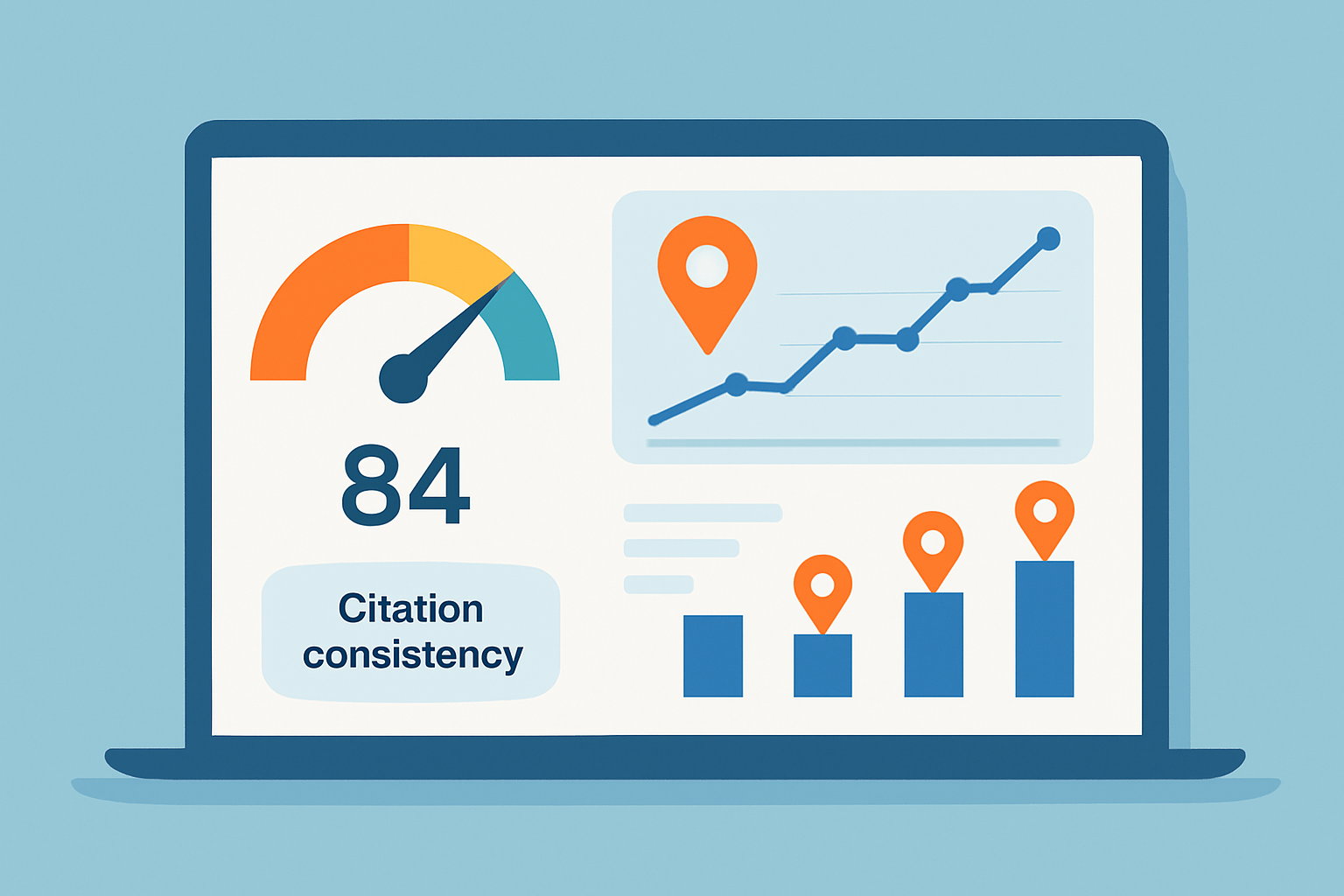Citations SEO Strategy That Actually Works


Citations SEO is a key player in the local SEO game but many businesses either overlook it or get it wrong. At its core it is all about how your business details—think name, address and phone number—show up across the vast web.
What Exactly Do Citations Mean in the World of SEO?
A citation is basically any online shout-out of your business’s essential contact info like your name, address and phone number often dubbed NAP. These little mentions don’t always include a link back to your website but act as solid references scattered across directories, local listings, social media and other places you might not immediately think about.
- A citation is a way to confirm important business details like the name, address and phone number (NAP) on another website and adds extra credibility to your information.
- Structured citations appear in business directories with clearly defined fields similar to what you’d find on Yelp or Yellow Pages and keep everything organized.
- Unstructured citations show up in less predictable places such as blog mentions, press releases or social media posts where the details aren’t placed into specific boxes.
- Keeping your NAP details consistent across all these citations is more than just a neat trick. It is one of the best ways to build trust with search engines and prevent confusion.
Understanding what citations are and how they work is absolutely essential. Search engines lean on citations to verify your business’s presence and location.
Why Citations Matter Big Time for Local SEO
Citations act like digital breadcrumbs, helping search engines verify your business’s authenticity and local roots. This kind of trust usually gives you a leg up in local search rankings and a better shot at that coveted local pack. On top of that, they boost your brand’s visibility and credibility.
- Citations play a key role in boosting your business’s credibility with local search algorithms—it’s like giving Google a nudge to take you seriously.
- Making sure your citations are spot-on increases the odds that you’ll appear in Google’s local pack and map results where it counts.
- When your citations stay consistent customers are more likely to trust you because they can count on accurate and reliable info every time.
- Plus, spreading your citations across different platforms stretches your online footprint and boosts your visibility.
"> A citation acts like a digital handshake, confirming your business’s existence and location not just to search engines but also to real people searching online. It’s one of those behind-the-scenes trust builders that often goes unnoticed but packs a punch in boosting your visibility."
Common Misunderstandings About Citations in SEO (and Why They Matter More Than You Think)
Citations are important but often misunderstood—like that one friend who always gets details wrong. Some individuals focus on the number of citations or assume that just having citations will boost rankings. Others think once a citation is out there, it is set in stone and never needs revisiting. This section aims to clear up those misconceptions and explain what truly makes citations effective: quality, accuracy and consistency.
- Having more citations doesn’t automatically boost your SEO because low-quality or spammy citations can sometimes harm your rankings. It’s a classic case of quality over quantity.
- Structured citations tend to be much better for SEO than the vague or unstructured mentions you might find.
- Keeping your citations updated as your business information changes is essential so you don’t confuse search engines or potential customers.
- Making sure your NAP data is accurate and consistent across all citations matters far more for SEO than simply having a large number of listings.
How to Craft an Effective SEO Strategy Using Citations (And Actually Make It Work)
A solid citations SEO strategy usually puts quality, relevance and consistency front and center rather than just piling up numbers. It often kicks off with a good once-over of existing citations. This means picking the most trustworthy sources, double-checking that NAP details are spot on, crafting listings that inspire confidence and keeping a regular eye on citation status.
Give your current citations a good once-over to catch any pesky errors or inconsistencies that could throw search engines for a loop.
Keep an eye out for authoritative citation sources and directories that fit your industry and location like a glove.
Double-check that your business’s name, address and phone number are spot-on and consistent across every listing—no slip-ups here.
Sprinkle in new citations on trustworthy platforms where your target audience naturally hangs out.
Make it a habit to monitor and update your citations regularly to keep them fresh, reflect business changes and banish duplicates for good.
Every step counts when it comes to building a solid citation profile. A thorough audit can uncover hidden issues that might quietly sabotage your SEO, such as conflicting phone numbers or outdated addresses. Choosing the right sources means you’re focusing your energy where it truly matters. Keeping a close eye on NAP consistency helps search engines recognize your listings as a clear and trustworthy entity. Adding fresh citations isn’t just about numbers; it’s about extending your reach carefully and strategically. Tools like Moz Local or Semrush’s Position Tracking are great allies in this process, providing data-driven insights that make it feel less like guesswork.
Taking a Closer Look at Your Existing Citations
Starting with an audit is absolutely key to spotting those pesky discrepancies—like inconsistent phone numbers or outdated addresses—that can throw both search engines and users for a loop. Those little mismatches might seem harmless but they quietly chip away at your local SEO mojo.
Picking the Best Sources for Citations
Not all citation sources carry the same clout. You’ll get the best bang for your buck by picking citation sites that boast strong domain authority and are relevant to your industry while attracting solid local traffic. General directories like Google My Business are must-haves.
| Citation Source Type | Example Sites | Domain Authority (DA) | Relevance |
|---|---|---|---|
| General Directories | Google My Business, Yelp | High (80-100) | Casts a wide net across all kinds of local businesses, making sure no stone is left unturned |
| Niche/Industry Directories | Healthgrades (health), Avvo (legal) | Medium (50-70) | Zooms in on specific industries, perfect when you need that targeted spotlight |
| Local Directories | Chamber of Commerce, Local.com | Medium to High | Focuses squarely on particular geographic areas, giving your presence a neighborhood vibe |
| Social Platforms | Facebook, LinkedIn, Instagram | High (70-90) | Boosts social interaction and local visibility, because sometimes it’s who you know that counts |
Keeping NAP Details Consistent (Because Details Matter More Than You Think)
NAP consistency is absolutely important for citation SEO. Search engines rely on consistent business details to confidently connect your listings and boost your ranking. Even small differences or overlooked typos can damage your online presence.
- Make sure your business name and address stay consistent across all platforms—no sneaky abbreviations or alternate versions anywhere.
- Keep the formatting of phone numbers, street names and suite numbers steady everywhere you list them.
- Take a close look at all your data entries to catch typos or slip-ups before they cause headaches.
- When your business contact details change, update every citation without delay—it saves a world of trouble down the line.
Thoughtfully Building New Citations
Because crafting reliable references isn’t just about ticking boxes—it’s about weaving trustworthy stories that stick.
When adding new citations, it’s usually smarter to zero in on quality over quantity. Aim for well-respected directories and platforms where your ideal customers are most likely to drop by. Steer clear of those sketchy, low-quality directories that can do more harm than good to your rankings.
- Aim to submit your business to directories that fit your industry and local area.
- Set up official profiles with clear and accurate business details to avoid guesswork.
- Avoid directories that seem shady or encourage mass submissions because they often cause problems.
- Focus on platforms where your ideal customers spend time or are likely to engage so you’re in the right place at the right time.
Keeping a Close Eye on and Regularly Updating Citations
Keeping your citations accurate is definitely something you have to watch closely. I have found that using SEO tools and manual checks works best for regularly reviewing your listings for errors or duplicates. Fix those errors as soon as they appear and update your details whenever your business moves, changes phone numbers or undergoes a rebrand.
Tracking the Effectiveness of Your Citation SEO Efforts Because What Gets Measured, Gets Managed
Keeping track of how well your citation SEO is working really helps you understand the benefits of your effort. Watch for improvements in local search rankings and note any shifts in organic traffic from local searches. Also, check customer engagement metrics—these signs show how your citation management boosts visibility and attracts more potential customers.
- Keep an eye on local search rankings for those key location-specific keywords that really matter to your business. Things can change faster than you’d expect.
- Take a good look at your Google My Business insights to get a clearer picture of how people are interacting with and seeing your profile. It is like getting a sneak peek behind the curtain.
- Dive into your web analytics tools to track exactly where traffic from local directories is coming from. It’s a bit like detective work but with fewer trench coats.
- Make it a habit to regularly check the accuracy and trustworthiness of your citations using specialized SEO tools because in this game, details really do make all the difference.

Dashboard visualizing local SEO metrics such as citation consistency, ranking improvements, and traffic from local sources
Typical Challenges and How to Steer Clear of Them
Businesses often find themselves tangled up in headaches like duplicate listings and messy NAP data that doesn’t match. They also deal with outdated citations and occasional run-ins with less reliable citation vendors. These hiccups throw search engines off the scent, chip away at your SEO mojo, and can drag down your local rankings before you know it.
- Keep an eye out for duplicate citations and clean them up regularly by combining or removing them to avoid conflicting information that might sneak in.
- Double-check every citation for accuracy before publishing and during routine audits.
- Update your listings promptly whenever business details change because outdated information quickly causes a loss of trust.
- Avoid low-quality citation vendors who push bulk submissions without proper control or verification.
Unleash Your SEO Prowess with Semrush
Are you struggling to boost your online visibility and drive more traffic to your website? Semrush is the ultimate SEO and digital marketing tool that can take your Internet Marketing game to new heights. With its powerful suite of features, you can gain a comprehensive understanding of your market, optimize your content, and outrank your competitors.
- Uncover Profitable Keywords with Advanced Research
- Analyze Your Site's Health with Detailed Audits
- Monitor Backlinks and Stay Ahead of Competitors
- Streamline Content Creation with Insights and Trends








